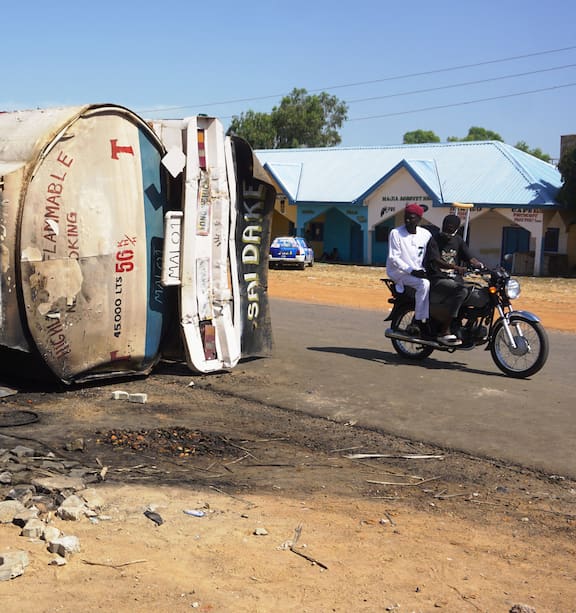In Nigeria, incidents involving fuel tankers breaking down or spilling their contents on the road are not uncommon. Tragically, these situations often attract crowds of individuals attempting to scoop fuel from the ground using buckets, rubber containers, and other makeshift tools. While it might seem like a quick way to collect free fuel, this practice is fraught with danger, often leading to devastating consequences.
The Risk of Explosion
One of the most immediate and life-threatening risks of scooping fuel is the potential for an explosion. Fuel is highly flammable, and even a small spark can ignite the spilled substance, resulting in a massive fire or explosion. In many cases, the presence of exposed electrical wires, static electricity, or even the heat from nearby vehicles can trigger such an incident.
Nigeria has witnessed several tragic events caused by fuel explosions during these situations:
• Ogbaru, Anambra State (2019): Over 40 people lost their lives when a fuel tanker exploded while people were scooping fuel from the spill.
• River State (2021): Several individuals died in a similar scenario when a tanker exploded, leaving many injured and others permanently scarred.
These incidents are stark reminders of the fatal consequences of such risky behavior.
Lack of Awareness About Health and Safety
The practice of scooping fuel reflects a broader issue: a lack of awareness and adherence to basic health and safety standards. Many people are unaware of the dangers involved or underestimate the risks because of immediate economic desperation. Key factors contributing to this behavior include:
• Poverty and Unemployment: Many individuals see spilled fuel as an opportunity to make money by reselling it or using it for personal needs. The economic struggles faced by many Nigerians push them to take extreme risks for a perceived gain.
• Ignorance of Risks: A lack of proper education and awareness about the dangers of handling fuel leads people to act recklessly, without understanding the potential consequences.
• Inadequate Emergency Response: In some cases, delays in emergency response allow people to access the scene before safety measures are put in place.
Environmental and Health Hazards
Beyond the immediate risk of explosion, scooping fuel from tanker spills poses significant environmental and health hazards:
• Environmental Damage: Fuel spills contaminate the soil and nearby water bodies, leading to long-term environmental degradation. This contamination can harm local ecosystems and make water sources unsafe for consumption.
• Health Risks: Direct contact with fuel and prolonged exposure to its fumes can cause serious health issues, including skin irritation, respiratory problems, and even long-term conditions like cancer.
The Role of Authorities
Preventing these tragedies requires a multi-faceted approach involving law enforcement, public education, and improved safety measures.
• Swift Emergency Response: Authorities must respond quickly to fuel spills, cordoning off the area and ensuring that people cannot access the spill site. Fire services, police, and environmental agencies should work together to manage the scene effectively.
• Public Awareness Campaigns: There is an urgent need to educate the public about the dangers of scooping fuel and the importance of health and safety practices. Radio, TV, and social media campaigns can play a crucial role in spreading this message.
• Stricter Regulations: Policies should be enforced to hold fuel transport companies accountable for spills, ensuring they take necessary precautions to prevent accidents.
• Community Engagement: Local leaders, religious groups, and community organizations should advocate for safer behaviors and emphasize the consequences of engaging in such dangerous activities.
A Call for Change
The recurrent cases of people scooping fuel from tanker spills in Nigeria highlight the need for urgent action. While economic hardship may drive individuals to take such risks, the loss of lives and long-term consequences far outweigh any short-term gains.
Promoting a culture of safety and awareness is essential. By prioritizing education, improving emergency response systems, and enforcing regulations, we can reduce the occurrence of these tragedies and protect lives. Safety is a shared responsibility, and it begins with understanding that no amount of fuel is worth a human life.





